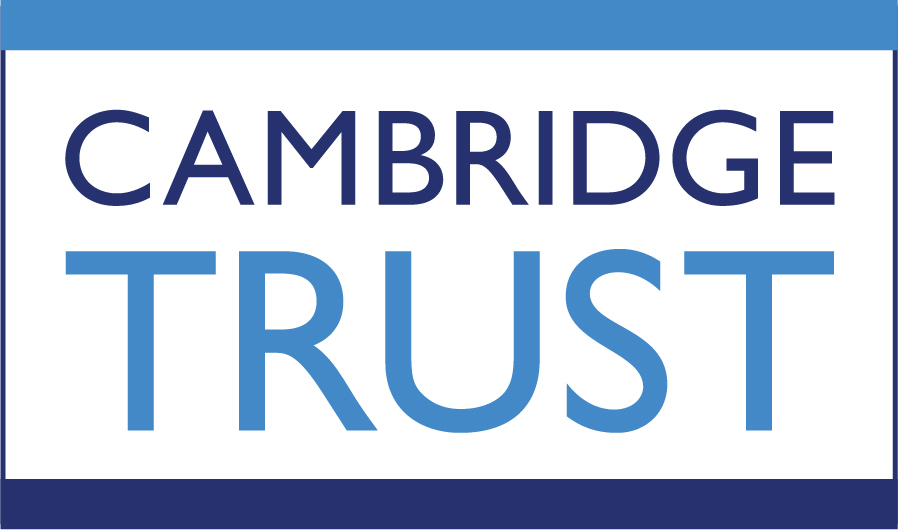Financial Assistance for Trust scholars
If you are a current student, and receive funding from the Cambridge Commonwealth, European & International Trust, you may be able to apply for financial assistance towards conference funding, extension funding or exceptional funding. The Trust has limited resources for the provision of additional funding.
Please refer to the sections below for specific information and application details (including application forms).
If you need any further information or have any queries, please contact the Scholarships Team.
IMPORTANT INFORMATION
- Additional funding is discretionary. There is no guarantee that the Trust will approve requests for additional funding, either in full or in part.
- Undergraduate students, students on one-year taught postgraduate courses and students receiving part-scholarships are not normally eligible for additional grants from the Trust.
- If funding partners contribute towards the cost of your scholarship, there is no need for you to apply directly to them as the Trust will administer this on their behalf.
- Please do not apply for additional funding from the Trust until you have researched all other possible sources, within your College, your Department and other external organisations.
- Please do not apply to the Postgraduate Financial Assistance Fund (PGFAF) if you receive full funding (UCF and maintenance) from the Trust as you are not eligible for that funding.
- Please read the guidance below and the relevant sections of our Guidelines for scholars before making an application.
- If you are applying for Leave to Work Away or for intermission, please consult the web pages of the University’s Cambridge Students for the full procedure.
- You must have completed and returned your latest Scholars’ Annual Report to the Trust before you make an application.
- If you are awarded funding from another source, the Trust reserves the right to adjust the value of any extension funding offered. You must inform the Trust if you are offered funding from other sources for your study at Cambridge at any time before or during this period. Failure to provide full details may lead to the cancellation by the Trust of any additional funding.
- If you require help finding alternative sources of funding, please contact the Scholarships Team.
FIELDWORK FUNDING & RESEARCH COSTS
The Trust does not offer funding for fieldwork. For funds to support fieldwork, you should contact the Course Administrator in your Department who will be able to advise you about the application process if funds are available. Most Departments have access to fieldwork funding through their School.
The Trust does not provide funding for the direct costs of research (e.g. bench fees, lab equipment, etc.). You should contact your Department.
CONFERENCE FUNDING
During the tenure of a PhD award, scholars can apply for funding towards one conference, up to a maximum of £500 (applications for virtual conference fee registrations will also be considered).
Important information
- It is the Trust’s policy that retrospective applications cannot be considered.
- Applications made for conferences that take place during a period of extension will not be considered.
- Scholars with Honorary Trust scholarships will not be eligible for conference funding.
- Scholars who are no longer receiving funds from the Trust will not be eligible for conference funding.
- The conference you wish to apply for must take place within the duration of your scholarship, and must be relevant to your studies.
- Please be aware that only one conference grant may be awarded. If you have already received a conference grant from the Trust, we will not be able to consider further applications.
- If an application for conference funding is declined (and you have not previously received conference funding from the Trust), you may apply again for a different conference.
- We may share your application with your College Tutor and/or Supervisor/Course Director, should we require additional information.
- If made an award, we would like you to prepare and send us a brief summary/report after you have attended the conference, to set out how attendance has benefitted you and the course of your research and development.
- If you receive funding for a conference and subsequently do not attend, we would ask for the funds to be returned.
How do I apply for conference funding? INCLUDES FORM
Applications can be made using the Trust’s application form CTConfForm.
If you require conference funding as part of an extension funding application, please submit separate applications for both (see the Extension Funding or Exceptional Funding sections).
When should I submit my application?
Please ensure that the form is completed accurately and sent to the Trust at least six weeks before a decision is required.
When will I hear if my application has been successful?
Applications are reviewed in the month following application submission (so, for example, if you submit it in June it will be reviewed in July). You will be informed of the outcome as soon as possible.
Please note, the Trust’s busy period for extension funding applications is July – September so there may be a delay in getting back to you. Your patience is appreciated.
EXTENSION FUNDING
Scholars who receive full maintenance from the Trust may apply for an extension of this funding. Awards from the Trust for a PhD are usually of a tenure of three years (unless otherwise stated in the case of MRes and PhD 1+3) and for a Master’s degree, the tenure is usually 1 year (or sometimes 9 months or 2 years).
PhD students may remain on the Register of Postgraduate Students for a further 12 month 'writing up' period, and will normally be automatically exempt from payment of University Composition Fees during that time. Please be aware that all students requiring an extension to cover writing up periods need to apply to the Trust before any additional maintenance can be considered.
If you do not receive full maintenance from the Trust, you may not be able to apply for extension funding. Please contact the Scholarships Team for guidance.
Important information
- Applications will be considered by the Trust’s Review Panel on a case-by-case basis.
- An application to extend your submission date should be made, using CamSIS, 3-6 months in advance of present submission deadline.
Am I eligible for extension funding?
The Trust will consider applications for additional funding for a period of extension if:
- you have the support of your College Tutor and Supervisor.
- it can be shown that reasons beyond your control have contributed to the need for extra time.
- it is certain that no further University Composition Fee is payable on your behalf.
- you have a plan of work which will take you to completion.
How do I apply for extension funding? INCLUDES FORM
Applications can be made using the Trust's application form CTAddFundForm.
The Trust will treat all supporting personal information in the strictest confidence.
If you require conference funding as part of an extension funding application, please submit separate applications for both (see the Conference Funding section).
When should I submit my application?
Applications for extension funding should be made as close to the end of your funding end date as possible, to enable the Trust to have a clear indication of your financial need at that time, and your timeline for completion.
You should allow sufficient time between submitting an application and your funding award end date.
If the first quarter of your period of extension is: |
Please send your completed form to the Trust: |
Michaelmas Term (1 October) |
Between 30 June and 15 August |
Lent Term (1 January) |
Between 30 September and 15 November |
Easter Term (1 April) |
Between 30 December and 15 February |
Long Vacation (1 July) |
Between 30 March and 15 May |
We can accept applications after the deadline, but we would strongly advise you to submit your application as close to the deadline as possible.
PLEASE ALLOW PLENTY OF TIME TO GET YOUR APPLICATION TO US.
WE CANNOT GUARANTEE THAT IT WILL BE REVIEWED STRAIGHT AWAY.
When will I hear if my application has been successful?
Applications are reviewed in the month following application submission (so, for example, if you submit in June it will be reviewed in July). You will be informed of the outcome as soon as possible.
Please note, the Trust’s busiest period for extension funding applications is July – September so there may be a delay in getting back to you. Your patience is appreciated.
How much extension funding can I apply for?
A discretionary maintenance allowance for the writing-up period of typically six months is available on request (please see the "How do I apply" section above) . In exceptional circumstances, should you require additional funding past this point, a second application for extension funding may be considered to allow for successful completion of all studies. Please note, funding is not guaranteed.
After discussion with your supervisor and advisers, plans for submission of your thesis and completion of your research should be customised to fit within the length of additional time and the constraints the funding will allow.
Students should carefully consider, realistically, how much longer (in months) they will need to be supported up to submission. It is important to bear in mind that further extensions of support beyond this application may not be available.
Any support from the Trust will normally be limited to no more than a contribution towards maintenance costs for a brief additional period up to the point of submission only.
The Trust would ask for your understanding about customising your submission to fit within the additional time for which the funding is available. If you submit your thesis earlier than expected, or you find you have funds beyond what is needed, the Trust would welcome any return.
EXCEPTIONAL FUNDING
Fully funded scholars should not normally need to apply to the Trust for exceptional funding as maintenance payments are calculated to meet living costs whilst studying. If, however, you run into financial difficulties, the Trust will consider applications for exceptional funding.
The Trust will consider exceptional funding applications for students with a partial award but please do bear in mind that adjustments to awards are not normally allowed and the Trust would expect to hold students to the financial guarantee that they undertake in order to secure their place.
What is "exceptional funding"?
Exceptional funding (sometimes referred to as "hardship") is unforeseen additional funding that is needed due to reasons beyond your control.
This would include:
- Bereavement.
- Serious illness which has resulted in a period of medical intermission.
This would not include:
- Non-medical intermission (e.g. for an internship).
- Unforeseen childcare or dependant costs.
- Funding to cover a period of extension (please refer to the "extension funding" section).
If you are unsure, please contact the Scholarships Team for guidance.
Am I eligible for exceptional funding?
The Trust will consider applications for assistance:
- If it is clear that exceptional funding is required because of an unforeseeable change of circumstances since you came to Cambridge, due to reasons beyond your control. It would not necessarily include the failure of overly optimistic funding plans.
- If you are nearing the end of your degree course.
- If the grant from the Trust (and other sources) will be sufficient to enable the successful completion of your course.
How do I apply for exceptional funding? INCLUDES FORM
Applications can be made using the Trust's application form CTAddFundForm.
The Trust will treat all supporting personal information in the strictest confidence.
When should I submit my application?
Applications can be made at any time. If possible, please allow as much time as you can as we cannot guarantee an immediate response.
When will I hear if my application has been successful?
Applications are generally reviewed in the month following application submission (so, for example, if you submit in June it will be reviewed in July). However, if a request is deemed to be urgent, it may be reviewed sooner.
You will be informed of the outcome as soon as possible.
Please note, the Trust’s busy period for extension funding applications is July – September so there may be a delay in getting back to you. Your patience is appreciated.


